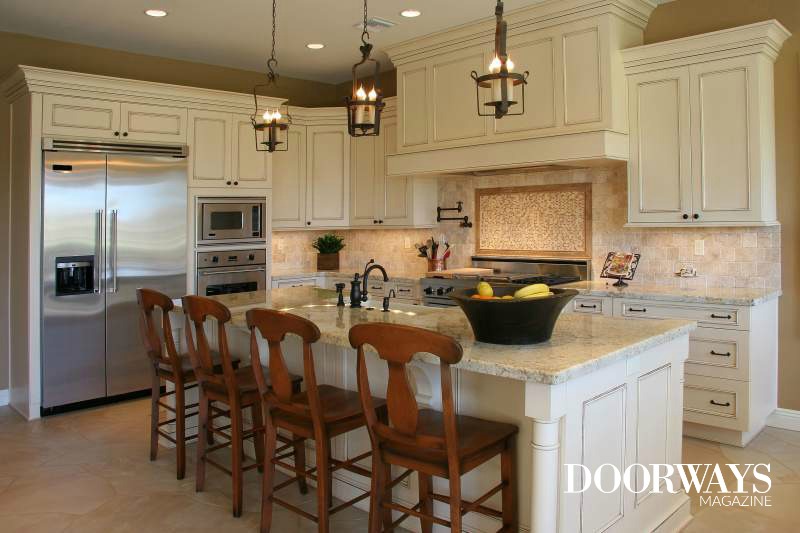Sun, Nov 25, 2018
Article may contain affiliate links. As an Amazon Associate I earn from qualifying purchases.

I was recently in a design showroom comparing kitchen countertops for an upcoming remodeling project. Just like you may be wondering about whether Quartz or Granite is better, I too was having the same dilemna.
Although I have experience working with a wide range of materials, my go-to countertop choice is always Granite or Quartz. The reason is because they are both durable and timeless design options. Not to mention, they are low maintenance and available in a wide range of colors.
However, the main difference is that Granite is available in natural slabs and Quartz is an engineered surface. What do you need to know about installing an engineered countertop in your kitchen? I’ll reveal the answer in a minute, but first let me tell you a little more about Granite.
Granite
If you love the look of natural stone countertops - let’s be honest, who doesn’t - then Granite is perfect for you. Not only will your granite countertops be completely unique in color and design, but they will remain timeless for years to come.
Do you dream of having a gourmet kitchen? If so, you’ll love the fact that Granite is heat and scratch resistant, too.
The main disadvantage of Granite vs Quartz is that the natural stone is porous. Meaning, you’ll need to seal it regularly to prevent unsightly stains from forming. Although Granite needs to be sealed, in general it is a very low maintenance kitchen countertop material.
Benefits of Granite Countertops:
Heat Resistant
Scratch Resistant
Not Seamless
Undermount Sink Compatible
Porous Surface
Low Maintenance
Wide Range of Natural Colors
Quartz
Although Quartz countertops are engineered and Granite is all natural, they have many things in common. For example, Quartz is also heat and scratch resistant.
However, since Quartz countertops are created using 93% Quartz and 7% resin, they are non-porous. Meaning you won’t have to seal them - ever! If you find yourself making a mess in the kitchen every time you cook, a non-porous surface could help prevent unsightly stains from appearing overtime.
Now we arrive at the main difference between Granite and Quartz - color selection. Granite slabs are 100 percent unique in design and color. That’s why you’ll need to search for a slab large enough to cover your countertops.
If one is not available, you’ll run the risk of having two Granite pieces that vary in color and vein patterns next to each other in your new kitchen. Major design faux-pas.
On the other hand, Quartz countertops are available in hundreds of different designs and colors. The best part is that since these slabs are man made, you can expect the texture and color to consistent in every piece of Quartz you purchase.
Benefits of Quartz Countertops:
Heat Resistant
Scratch Resistant
Not Seamless
Undermount Sink Compatible
Non-Porous Surface
Low Maintenance
Wide Range of Artificial Colors
Granite vs Quartz Cost Comparison
Before I jump into a comparison of the cost of Granite vs Quartz, I need to tell you something important. Trying to estimate the cost of your new countertops online is like trying to herd cats.
It’s almost impossible.
I know this sucks, especially if you’re just trying to get a basic estimate at the beginning of your project.
The reason it’s so difficult to get an accurate cost estimate is because there are too many variables to take into account. For example, we haven’t even talked about edge styles, sink cutouts, or countertop installation. Each of these will add to your overall cost.
That being said, I still want to give you a good place to start. The estimates below are guidelines to use when setting your budget.
Like all building materials, Granite and Quartz are available in a wide range of styles and quality levels, which can greatly affect the price. My estimates below are for standard quality countertops installed by a professional.
So how much do new countertops cost?
Granite: ~$150 per square foot
Quartz: ~$125 per square foot
While these are average costs, you may be able to get both of these materials for as little as $40 per square foot. If you are flexible, there are many opportunities to get clearance deals as well as Granite remnants for cheap. The hard part is knowing where to look.
Next Steps
As I mentioned earlier, I got the inspiration to write this article as I was visiting a local design gallery. While I was struggling to find inspiration for an upcoming project, I couldn’t decide between Granite or Quartz countertops.
I eventually chose Quartz because it gave my clients the modern look they were trying to achieve and we were able to get a great deal on a discontinued style.
So which countertop material should you choose for your kitchen?
If you love the look of natural stone but don’t want to deal with the hassles of Marble, Granite is an easy choice.
On the other hand, if you are worried about stains and the maintenance Granite requires, Quartz is the way to go.
Need Help Choosing the Perfect Kitchen Countertops?
Whenever someone joins my email list, I always ask them what projects are on their to-do list. To my surprise, the most common response I get is “new kitchen countertops.”
If new countertops are on your list too, then I have good news. In my new book, The Complete Guide to Incredible Countertops, I answer the most frequently asked questions I’ve received from my readers.
Inside you’ll learn all about measuring your countertops, choosing timeless materials and selecting an edge style you’ll love.
READ NEXT
